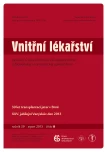Liver transplants in tumours and alcoholic cirrhoses
Authors:
V. Mejzlík; L. Husová; M. Kuman; S. Štěpánková; J. Ondrášek; P. Němec
Authors‘ workplace:
Centrum kardiovaskulární a transplantační chirurgie Brno, ředitel doc. MU Dr. Petr Němec, CSc.
Published in:
Vnitř Lék 2013; 59(8): 698-704
Category:
Overview
The treatment of hepatocellular carcinoma requires a multidisciplinary approach; liver transplant is suitable only in the minority of strictly selected patients. The CSTC Brno applies the so ‑ called Milan criteria. As of 31 December 2012 the CSTC Brno performed liver transplants in 16 patients with hepatocellular carcinoma in cirrhosis, with a five‑year survival rate of 40% and a 10‑year survival after transplant of 20%. It is a paradox that the longest living (30 years) patient of CSTC Brno underwent the transplant for a large fibrolamellar hepatocellular carcinoma, which emphasises the prognostic significance of the tumour histology – criterion taken into account for practical reasons only in some indication schemes. Liver transplant for cholangiocarcinoma is no longer being carried out in CSTC. Five patients underwent this operation in the past and the longest living one survived for four years after the transplant. Benign liver tumours (adenomatosis, cystadenoma, hemangioma with compression symptoms) are rather rare indications and transplant results are positive. Four patients were transplanted for liver carcinoid, with one patient experiencing recurrence. The most frequent compact indication for liver transplant in CSTC Brno concerns alcoholic cirrhosis (24%, 108 patients); the survival rate of these patients after transplant is very good (81% 5‑year survival and 68% 10‑year survival). Likewise, efforts are made to select patients with a low risk of alcohol abuse after the transplant, which is, however, not very successful. The recurrence of some kind of alcohol abuse occurred in 26% transplanted patients, while seven died of alcoholic cirrhosis of the graft.
Key words:
liver transplant – hepatocellular carcinoma – carcinoid – alcoholic liver cirrhosis – alcoholism recurrence after transplant
Sources
1. Data United Network for Organ Sharing (UNOS), 2003, 2007.
2. Penn I. Hepatic transplantation for primary and metastatic cancers of the liver. Surgery 1991; 110 : 726 – 734.
3. Molmenti EP, Klintmalm GB. Liver transplantation in association with hepatocellular carcinoma: An update of the International Tumor Registry. Liver Transpl 2002; 8 : 736 – 748.
4. Mazzaferro V, Regalia E, Doci R et al. Liver transplantation for the treatment of small hepatocellular carcinomas in patients with cirrhosis. N Engl J Med 1996; 334 : 693 – 699.
5. Mazzaferro V, Llovet JM, Miceli R et al. Predicting survival after liver transplantation in patients with hepatocellular carcinoma beyond the Milan criteria: a retrospective, exploratory analysis. Lancet Oncol 2009; 10 : 35 – 43.
6. Yao FY, Ferrell L, Bass NM et al. Liver transplantation for hepatocellular carcinoma: expansion of the tumor size limits does not adversely impact survival. Hepatology 2001; 33 : 1394 – 1403.
7. DiMartini A, Weinreib R, Fireman M. Liver transplantation in patients with alcohol and other substance use disorders. Psychiatr Clin North Am 2002; 25 : 195 – 209.
8. Pageaux GP, Michel J, Coste V et al. Alcoholic cirrhosis is a good indication for liver transplantation even for cases of recidivism. Gut 1999; 45 : 421 – 426.
9. Platz KP, Mueller AR, Spree E et al. Liver transplantation for alcoholic cirhosis. Transpl Int 2000; 13 (Suppl 1): 127 – 130.
10. Karman JF, Sileri P, Kamuda D et al. Risk factors for failure to meet listing requirements in liver transplant candidates with alcoholic cirhosis. Transplantation 2001; 71 : 1210 – 1213.
11. DiMartini A, Weinreib R, Fireman M. Liver transplantation in patients with alcohol and other substance use disorders. Psychiatr Clin North Am 2002; 25 : 195 – 209.
12. Foster PF, Fabrega F, Karademir S et al. Prediction of abstinence from ethanol in alcoholic recipients following liver transplantation. Hepatology 1997; 25 : 1469 – 1477.
13. Mackie J, Groves K, Hoyle A et al. Orthotopic liver transplantation for alcoholic liver disease: A retrospective analysis of survival, recidivism, and risk factors predisposing to recidivism. Liver Transpl 2001; 7 : 418 – 427.
Labels
Diabetology Endocrinology Internal medicineArticle was published in
Internal Medicine

2013 Issue 8
-
All articles in this issue
- 30 years of liver transplants in Brno
- Liver transplant indication and waiting list inclusion
- Liver transplant outcomes in Brno
- Development of immunosuppressant treatment after liver transplant
- Immunosuppression after liver transplant, now and in future
- Deceased organ donors, legal regulations governing diagnosis of brain death, overview of donors and liver transplants in the Czech Republic
- Surgical techniques to counter the lack of donors
- Interventional radiology options to address certain complications of the orthotopic liver transplant
- Biliary (cholestatic) complications in the liver graft biopsy samples early after transplantation
- Liver transplants in viral hepatitides
- Liver transplants in tumours and alcoholic cirrhoses
- Cardiorenal syndrome by heart failure
- New drugs in type 2 diabetes mellitus therapy
- Where is the treatment of hypertension heading?
- Renal denervation 2013
- The strategy of the Czech Society for Oncology of the Czech Medical Association of J. E. Purkyně for the organisation of oncological care in the Czech Republic
- Metformin: the overlap of diabetology and oncology
- Colitis precipitated by Clostridium difficile – a serious current problem
- Recent possibilities of treatment of End Stage Renal Desease
- Internal Medicine
- Journal archive
- Current issue
- Online only
- About the journal
Most read in this issue
- Liver transplants in tumours and alcoholic cirrhoses
- Immunosuppression after liver transplant, now and in future
- New drugs in type 2 diabetes mellitus therapy
- Liver transplant indication and waiting list inclusion
